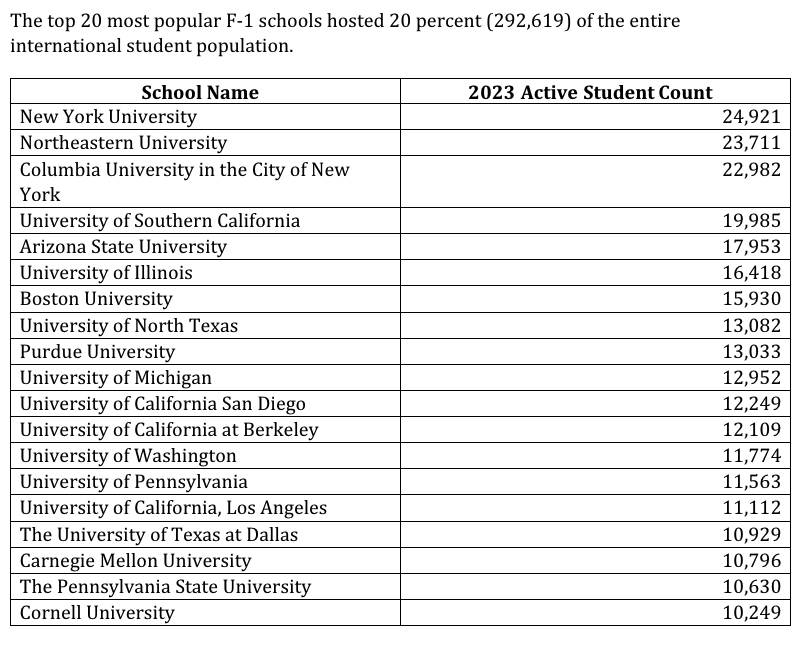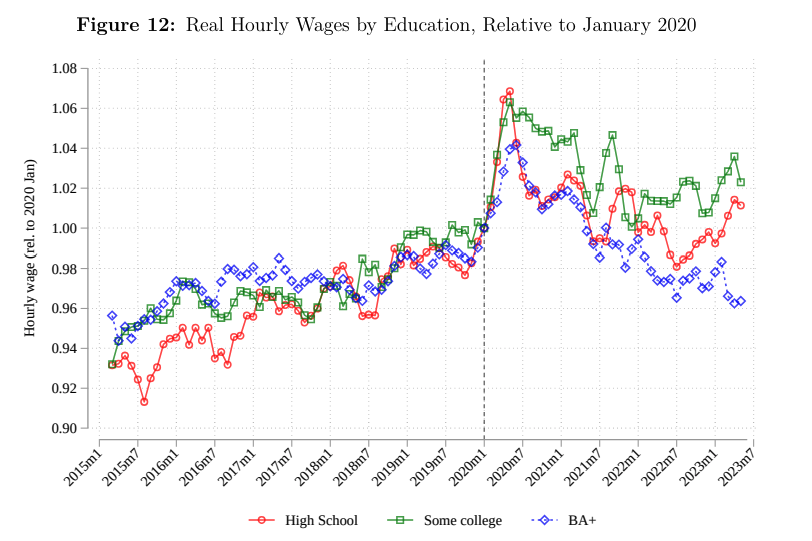American college graduates are losing jobs and opportunities in President Joe Biden’s high-migration economy, admits the Washington Post.
“Despite strong labor market, new college graduates struggle to find employment,” says the June 16 article, which continues:
Hiring in professional and business services — which includes jobs in tech, consulting, finance and media that are popular among new grads — has fallen 12 percent, according to federal data … Today’s recent graduates ages 22 to 27 have a higher unemployment rate — 4.7 percent, as of March — than the overall population, according to an analysis by the New York Fed.
The Post article — which was posted a few days before Biden is expected to amnesty another 1 million migrants — offers sympathetic profiles of two young American graduates who remain unemployed — and a profile of an Indian graduate who landed a U.S. job at a banking-related firm in Texas.
The winning foreign graduate is just one of the hundreds of thousands of foreigners who are being imported by Biden and his deputies to take white-collar jobs via little-known work permit programs. In this case, the Indian enrolled in a U.S. university to get up to four years of work permits via the Optional Practical Training (OPT) program:
Priyank Saxena applied for more than 500 jobs before he finally landed one, at a financial technology firm in San Antonio. Newly armed with an [May 2024] MBA from Rice University, he’d hoped to break into Big Tech or project management. But Saxena kept striking out: Even an internship at Dell Technologies wasn’t enough to get him in the door. He ended up going back to fintech, where he’d worked for six years before business school.
Since 2019, roughly 75 percent of all additional jobs have gone to Biden’s flood of roughly 10 million new migrants, including inexperienced OPT contract workers, blue-collar illegal aliens, and legal immigrants. The inflow delivers roughly one migrant for each American birth. The inflated supply of workers ensures lower salaries, less corporate investment in productivity-raising, high-tech workplaces, higher housing costs — and higher stock values on Wall Street.
Worse, many U.S. information technology jobs are sent to India once the Indian workers are fully trained in U.S. jobs.
“As bad as things are right now for college graduates, for Americans who’ve been recently laid off and are looking to find another job … it’s only going to get worse,” said Kevin Lynn, founder of U.S. Tech Workers, which advocates for U.S. professionals.
The vast, million-plus population of foreign white-collar workers — including roughly 600,000 mid-skill H-1B workers — is largely ignored by the national media, whose reporters prefer to focus on the interests of migrants.
Also, the media’s selected reporters and editors are eagerly distracted from the white-collar outsourcing programs by staged drama, such as President Barack Obama’s DACA amnesty, and Biden’s expected “Parole in Place” amnesty for the spouses of U.S. citizens.
That “Parole in Place” amnesty includes many white-collar migrants and is reportedly going to be announced Tuesday by Biden at the White House.
Meanwhile, Biden’s deputies are also inflating the foreign workers’ programs to import many more Indians for the jobs, salaries, careers, and homes sought by U.S. college graduates, most of whom lean Democratic. The OPT program, and its twin, the Curricular Practical Training Program, allow foreign graduates to work for five years in the U.S. for every college degree they sign up for.
The Department of Homeland Security reported the rapid inflow on May 22:
There were 160,627 pre- and post-completion optional practical training (OPT) students with both an employment authorization document (EAD) and who reported working for an employer in calendar year 2023, compared to 117,301 in calendar year 2022 —a 36.9 percent increase.
…
There were a total of 122,101 international students participating in science, technology, engineering, and mathematics (STEM) OPT in 2023. Most students participating in STEM OPT were from India (39.1%) or China (23.7%).
DHS reported that 377,000 Indian students, 330,000 Chinese students, plus roughly 280,000 other foreigners, paid full fees to enroll in many U.S. universities, including Rice.
Biden’s ambassador in India is trying to import yet more Indian graduates in 2024 for the careers needed by Biden’s voters:
Under President Donald Trump, officials revealed the companies that hired OPT workers instead of Americans. But Biden’s deputies have stopped releasing the data.
Jezz Bezos owns the Washington Post, and his giant Amazon companies have hired thousands of OPT and H-1B workers.
Advocates for the OPT program describe it as a junior version of the H-1B program, which keeps roughly 1 million foreign contract workers in U.S. white-collar jobs. The advocates also praise the programs for allowing CEOs to reach outside the U.S. labor market to hire the ‘best and brightest” people from around the world.
There is little evidence that Priyank Saxena fits that description.
Saxena is a graphic designer and marketer who got his undergraduate degree from Uttar Pradesh Technical University in August 2013. In 2015, the university was renamed the Dr. A.P.J. Abdul Kalam Technical University and includes hundreds of subordinate colleges and roughly 400,000 students.
His university is not mentioned on US News‘s list of “Best Global Universities in India,” and has the 31st spot in UniRank’s “Top Universities in India” list, which says it offers undergraduate courses in “science and technology.” His university gets no mention in the Indian Institutional Ranking Framework list of 1,000 Indian colleges. It is unranked on the Indian TimesHigherEducation.com site. The sixth-ranking Indian university — Aligarh Muslim University — is also based in Uttar Pradesh but is only ranked roughly 700 in a measure of universities worldwide.
But Saxena has several big advantages in his competion for jobs against new American graduates.
He worked for several years in India before enrolling at Rice, and the OPT program reduces employers’ payroll taxes.
Many American companies delegate hiring to Indian office managers who have economic incentives and tacit legal clearance to discriminate in favor of fellow Indians. Top U.S. managers accept this discrimination because the Indian hiring managers ensure that Indian hires work long hours and do not talk back to their American C-Suite executives, unlike more productive American graduates.
The Indian workers also have two huge government-delivered incentives to shut up and work long hours at low wages.
They are allowed to live in the United States as long as they keep their employers happy, and they are eligible to apply for residency and citizenship if their employers get them into the H-1B program. In November, 610,000 H-1B contract workers — and 650,000 spouses and older children — were working while waiting for roughly 140,000 green cards per year.
Many Indian executives are hired and promoted by investors to operate a “pipeline of cheap labor from India,” Lynn said. India’s huge and poor population is providing the disposable labor force and middle-management for the globalized labor market sought by the World Economic Forum, he said.
The forum and its network of investors are trying to strip Americans of their citizenship advantages, he said. “Citizens not only have rights, but also responsibilities, and that’s what they want to get rid of — and they will get rid of it if we don’t stop them.”
The process is far advanced in Canada.
Meanwhile, the combined supply of surplus U.S. and foreign graduates is so great that U.S. employers feel no need to help U.S. graduates climb the first few steps in the career ladder, according to the Washington Post:
“In this economy, I need someone who can hit the ground running,” said Elle Phillips, who is hoping to add a third employee to her Boise graphic design firm this summer but says many fresh grads lack the right communication and time-management skills. “There are so many things that require on-the-job training, that kids just don’t learn in school. I can get a lot more done with someone who has already hit their stride.”
Unsurprisingly, salaries for U.S. college graduates are drifting town. Annual salary growth for college graduates is below the salary growth for non-graduates, according to federal data.
The Post article noted that one of the two American graduates may be forced back to live at her parents’ house:
Camila Aponte started her job search in January …. [and] thought she’d have a good shot at a journalism or policy job. But so far she’s come up empty.
Aponte recently widened her search to include consulting and campaign jobs. If she hasn’t found anything by August, the 23-year-old plans to move back in with her parents. “I haven’t gotten to the point where I feel desperate yet,” she said. “But it’s been a lot harder than I thought it’d be.”
Biden’s high-migration economy is damaging his political support among U.S. graduates, partly because of migration’s impact on rents.
USA Today reported on one disillusioned Ethiopian immigrant graduate on June 16:
Beza Wossene, 37, of Philadelphia, said fellow academic Cornel West resonates with her. The Democratic Party is about the status quo, she said, while West represents the dramatic change the county really needs.
Her own financial struggles ‒ despite a master’s degree and job as a college administrator ‒ have reinforced for her the problems with America’s economic, social and racial situation and driven her to consider a third-party candidate, she said.
“I thought if I did everything that my parents didn’t do that I would be able to get myself out of the working class,” Wossene said. But “making ends meet, month to month with two young children has become really, really challenging with the cost of gas and the cost of food.”
Ironically, Wossene helps foreign college graduates take jobs and drive down salaries in the United States.
In his first term, Trump did modestly reduce the inflow of white-collar contract workers — despite well-funded protests from investors who complained that his curbs chopped $100 billion from their stock values.
Trump is now facing pressure from critical donors to avoid any reforms of their white-collar outsourcing programs. The New York Times reported on January 13 on Trump’s zigzagging between the demands of vital donors and decisive voters:
Mr. Trump said he thought it was “wrong” that people who made sacrifices to come to America and attend top U.S. schools should have to go home to their countries, one of the people said. Another person who was in the room recalled that Mr. Trump made the point that the high-skilled immigrants who received an American education could either be successful in the U.S. or in their home countries. He said that the best and the brightest were needed to help America, this person said.
It is not clear if Trump considers OPT graduates to be among the “best and brightest.”
Moreover, some investors are turning away from their prior demands for mass migration into the nation’s consumer economy.
“We always used to think [a] shrinking population is a cause for negative [economic] growth,” BlackRock founder Larry Fink said at a pro-globalist event in April hosted by the World Economic Forum in Saudi Arabia. He continued:
But in my conversations with the leadership of these large, developed countries [such as China, and Japan] that have xenophobic anti-immigration policies, they don’t allow anybody to come in — [so they have] shrinking demographics — these countries will rapidly develop robotics and AI and technology … If a promise of all that transforms productivity, which most of us think it will [emphasis added] — we’ll be able to elevate the standard living in countries, the standard of living for individuals, even with shrinking populations.
Fink, whose investment firm handles $10 trillion in funds, repeated the same productivity-first message at the June G-7 meeting, saying, “AI will also make people more efficient, meaning our smaller future workforce can still become more productive than our larger current one.”
Back in Washington DC, Biden’s White House is preparing another amnesty for roughly 1 million illegal migrants who are married to citizens. “This is unsustainable and can’t be allowed to continue,” Trump campaign tweeted on June 17.
“If you’re a professional, whether you’ve been in the workplace for a long time, or you’re just trying to get your foot in the door, you’re toast,” Lynn said. “You should have become a plumber.”




COMMENTS
Please let us know if you're having issues with commenting.